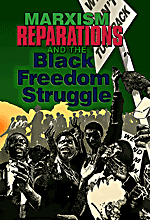

“If you stick a knife in my back nine inches and pull it out six inches, there’s no progress. If you pull it all the way out that’s not progress. Progress is healing the wound that the blow made. And they haven’t even pulled the knife out much less healed the wound. They won’t even admit the knife is there.” — Malcolm X
The topic of reparations has entered the public discourse and made it all the way to a hearing before the U.S. House of Representatives. But a conversation on reparations cannot be limited to the issue of chattel slavery in the 19th century. To do so would be to promote the lie that slavery was abolished. Slavery did not end. It was dealt a severe blow with the capitulation of the Confederacy, but the white-supremacist system, which created slavery and used it to siphon labor power from the masses of Black Americans, remained and it adapted. Chameleonlike, it shifted into Jim Crow, and Jim Crow shed its skin to reveal mass incarceration. Over and over, the outer form changed, but the repression remains. The knife remains.
Like 16th-century European imperialists did in Africa, modern-day prosecutors have sent armed troops into the Black community to steal people from their homes and sell them into bondage, leaving extraordinary violence, poverty and suffering in their wake. And just like the slavers of the early modern period, these prosecutors do this to feed an ever-expanding slavelike market driven by profit-hungry capitalist speculation. This is the context of modern-day slavery. A world where corporations profit from the building of prisons and the warehousing of human beings. Mass incarceration and its associated police state represent white-supremacist violence and economic exploitation in its 21st-century form. In order to bring reparations to people of African descent in the U.S., this system must be abolished.
If we’re going to have reparations, the knife of racial oppression must be fully removed. There must be a full accounting of white-supremacist crimes — an accounting that is not cut abruptly short at the year 1865. Give us reparations for Eric Garner. Give us reparations for the Central Park 5. Give us reparations for Stop-and-Frisk survivors and Freddie Gray and Sandra Bland. Give us reparations for no-knock warrants, solitary confinement and Amadou Diallo.
Justice is another key element of this discussion that is often ignored. True reparations are not just a payment for wages stolen in 1860 or a settlement for a family who lost a loved one to police terror in 2010. It is not enough. Reparation means justice. It means treating the perpetrators of white- supremacist violence as the criminals they are. To do anything less is to deny the humanity of their victims.
Why is it that when a police officer kills an unarmed Black person, it is almost impossible to secure a criminal conviction, but almost inevitable that a civil settlement will be won? Why are U.S. municipalities so willing to pay millions to victims’ families but so unwilling to punish the police? Part of this comes from the legacy of treating Black people as property — and by extension — treating violence against Black people as mere property destruction.
The necessary process of shifting away from this mentality — of Black people reclaiming our humanity — is the demand that crimes against Black people be met with real punishment. Without this shift, Black people may be free in name, but they will remain slaves in fact.
Finally, if we truly want reparations — to undo the destruction of white supremacy and repair the damage — we first have to identify the source of that destruction and dismantle it. Slavery came about because the wealthy sought to increase their fortunes by plundering the resources of others. The fastest way to do this was to steal the labor of a group of people who were seen as different and disposable. It is this system, where the rich loot from the poor, where the bosses feed off the workers, which drives white-supremacist violence. Everything else — prisons, detention centers, cops, judges and more — all flow from that original sin. True reparations would mean an end to capitalism itself.
Raposo is a Portuguese Marxist analyst, editor of the web magazine jornalmudardevida.net, where this article…
By Alireza Salehi The following commentary first appeared on the Iranian-based Press TV at tinyurl.com/53hdhskk.…
This is Part Two of a series based on a talk given at a national…
Educators for Palestine released the following news release on July 19, 2025. Washington, D.C. Educators…
On July 17, a court in France ordered the release of Georges Abdallah, a Lebanese…
The following are highlights from a speech given by Yemen’s Ansarallah Commander Sayyed Abdul-Malik Badr…